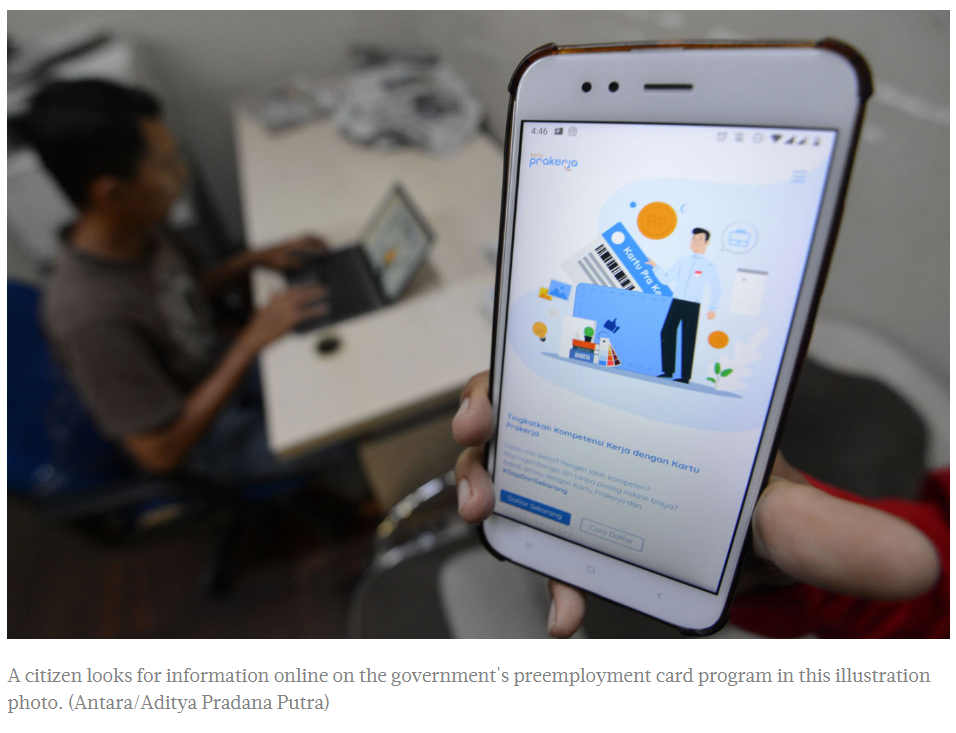Indonesia: Preemployment card may not help people return to work despite ‘new normal’: Experts
Recipients of funds and training under the government’s preemployment card may not be able to practice the skills they learn through the program because the labor market has not recovered, experts say.
Tadjudin Nur Effendi, an expert on labor issues from Gajdah Mada University in Yogyakarta, said the ongoing transition toward the so-called new normal, with regional administrations easing coronavirus restrictions, had yet to create new jobs.
“I do not think that [people getting back their job] has taken place, because demand in the labor market is still low,” Tadjudin told The Jakarta Post in a phone interview on Tuesday.
The comments come as around 400,000 people or 60 percent of preemployment card recipients have completed their first training, according to Panji Ruky, the director of communication, partnership and ecosystem development for the preemployment card program.
With many nonessential businesses shutting factories, the coronavirus restrictions have forced more than 1.7 million people out of work as of May 1, according to data from the Manpower Ministry. More than half of them were formal-sector workers furloughed by their employers.
In line with the ministry’s report, a survey on the program’s eligible recipients by the National Team for Accelerating Poverty Alleviation (TNP2K) found that 80.8 percent of the respondents were unemployed in May.
In January, only 37.6 percent of them told the survey they were unemployed, which suggests that they lost their jobs due to the pandemic.
Luhur Bima, a researcher at SMERU Research Institute, said firms were most likely to employ people they previously furloughed.
“Employers will be very cautious in restarting their business activity, so demand for labor amid the transition may not increase significantly,” Bima told the Post.
With a budget of Rp 20 trillion (US$1.4 billion), the government introduced the preemployment card in mid-April to help 5.6 million people whose job or small businesses were hit by the pandemic. The government estimates that 3 to 5.2 million people may lose their jobs because of the severe economic impact of the pandemic.
People affected by the pandemic are mostly young and educated, in line with the survey’s finding that 88 percent of the respondents were below 35 years of age and 59 percent were senior high school or vocational school graduates.
The unemployment rate was highest among people aged 15 to 24 years, which stood at 16.28 percent in February, an increase of around 1 percentage points from a year earlier.
[GRAPH: UNEMPLOYMENT RATE BY AGE GROUP – “Young and not working”]
Deni Purbasari, the executive director of the preemployment card program, maintained that the program was “not misdirected”, despite criticisms of its relevance to train the workforce at a time when employers are not hiring.
“If they are unemployed, young and educated, they are obviously a wasted resource,” Denni said in a virtual briefing on Monday. “We have to make sure that this jobless generation is learning something while the job market plunges.”
The survey found that 3,185 of the respondents, an overwhelming majority, hoped they would get new skills from the program, which partners with eight online learning platforms, including e-commerce giant Tokopedia.
The most popular training courses in the program are languages, entrepreneurship skills, digital marketing, makeup, coffee brewing and information technology, said Panji of the program’s management team.
The government offers Rp 600,000 in monthly aid as an incentive to encourage people to take the training, but those funds will only be disbursed once the recipient completes a course. Recipients are free to choose how to spend the money.
In the survey, 4,105 respondents said they would use the aid to make ends meet, clearly in line with the backdrop of losing income.
The second-most stated use of the aid was as capital to start a business, followed by funds to find a new job and for savings. Only 611 respondents told the survey they would use it to pay back debt.
Panji said Monday that the survey did not evaluate the impact of the preemployment card on job placement rates of the recipients, because “that would require a more rigorous analysis”.
“We have to see the preemployment card in the pandemic context with a semi-social assistance mission,” Panji said at the same briefing. “One of the achievements is disbursing the assistance and the feedback from recipients.”
As few as 7.7 percent of the respondents considered the training ineffective, some of them arguing that the absence of in-person learning compromised the effectiveness.
Despite the transition period, Panji said his office had not decided when to start conducting in-person training.
Source: https://www.thejakartapost.com/news/2020/06/10/preemployment-card-may-not-help-people-return-to-work-despite-new-normal-experts.html


 English
English




